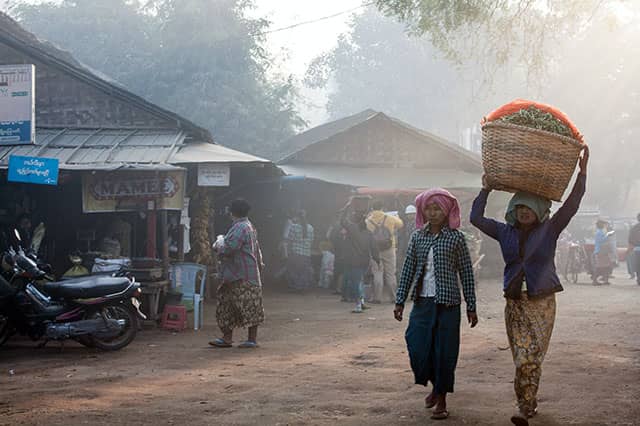Staying or Leaving Myanmar? What’s Needed is a Human Rights-led Approach

MCRB Director Vicky Bowman has co-authored a commentary with John Morrison, Chief Executive, and Salil Tripathi, Senior Advisor, Global Issues of MCRB’s co-founder organisation the Institute for Human Rights and Business, commenting on the approach businesses need to take as they consider their investments in and sourcing from Myanmar.
MCRB is working on a guide to Conducting Heightened Due Diligence in Myanmar under Military Rule which draws on international good practice and actual experience of companies in Myanmar since 1 February.
It is now more than seven months since the coup in Myanmar. The grave situation, with thousands jailed – including trade unionists, human rights defenders and journalists – and thousands more killed, has turned more acute, with the opposition calling for an uprising and compiling evidence of war crimes. Meanwhile the population is struggling through the third wave of the pandemic. In response, a number of OECD governments have implemented Magnitsky-style targeted sanctions on key military-connected individuals. To complement existing arms embargoes, on 2 September the UK sanctioned well-known Myanmar arms trader Tayza, and his Htoo Group of companies.
It makes sense for the international community to focus on those responsible for the coup and connected to the atrocities that have followed. But some are now seeking to widen the scope of these measures and call for a blanket economic boycott of the whole country.
We believe they should reflect on what history tells us of the consequences. There are lessons from Myanmar itself, and elsewhere, which show that such comprehensive boycotts can harm some of the most vulnerable workers whilst doing little to influence a coercive government. Look no further than Iraq. Attempts to isolate the poor from adverse impacts inevitably make the enforcement regime more convoluted, creating opportunities for unscrupulous businesses to benefit at the cost of small businesses that are not well-connected.
If Myanmar’s garment factories were to close, we know that the cost would be borne by over 600,000 workers, many of them women, who do not have the option of alternate employment. When the sector contracted by two-thirds in the late 1990s as a result of EU and US sanctions, many Myanmar garment workers headed overseas into exploitative and precarious situations in Thailand, Malaysia, China and beyond, paying significant recruitment fees to people traffickers and spending years away from their families.
It is undeniable that working conditions in Myanmar’s garment sector are far from perfect. COVID has worsened these conditions as factories struggle with cancelled orders and lockdowns. But conditions won’t be improved by Western brands cutting ties. Rather it will lead to mass layoffs, and the few remaining factories supplying to the cheapest end of the Asian markets – just as happened during the last military regime.
What apparel brands currently need to do is step up their due diligence and monitoring of factory conditions and how the coup and COVID are impacting on them. They should collectively assess – as the Ethical Trading Initiative recommends – the pros and cons of continued sourcing, what more they can do in support of workers’ rights and a return to democracy. If they decide to stop, they should identify what responsible disinvestment and withdrawal would entail in practical terms. And in the meantime, they should connect directly to those in the labour rights movement who are still active inside the country and work with them to ensure that problems are resolved.
Drawing on the UN Guiding Principles on Business and Human Rights, it could make sense to cut ties with Myanmar if a business is contributing to, or directly linked to, harm and cannot exercise any leverage – collectively or individually – to prevent or mitigate that harm. But the answer to that question will be different for each business or sector. In the manufacturing sector, companies have the leverage to ensure at least their own operations, and usually those of their business partners, respect human rights on issues such as worker safety, fair wages, and respecting the rights to freedom of association and expression, and not to be discriminated against, including as a union member.
In telecoms, Myanmar’s legal framework does not protect human rights on issues such as internet shutdown and surveillance. The military’s application of these laws has put Telenor in a difficult position. While it can operate responsibly concerning worker rights, the telecoms regulator is forcing it to undermine its customers’ rights to privacy. So Telenor has decided to leave Myanmar; the proposed buyer is a private equity company owned by the new – and former – Lebanese Prime Minister. But, Myanmar civil society organisations have complained to the Norwegian Government that the company is leaving without assessing the human rights impacts of doing so, and if such is the case, it does not abide by the word or spirit of the UN Guiding Principles.
Another serious question businesses must consider – particularly in a highly militarised situation – is whether to also run the risk of being complicit in the human rights abuses of others, and even legally liable. But does simply ‘being there’ make a business complicit in the abuses of Myanmar’s military regime? For that matter, did it do so in 2017, following the massive human rights abuses committed against the Rohingya which took place under a democratically elected government? Professor John Ruggie, the author of the UN Guiding Principles, writing in his 2008 report to the UN Human Rights Council noted that "mere presence in a country, paying taxes, or silence in the face of abuse is unlikely to amount to the practical assistance required for legal liability".
Nonetheless, companies in countries affected by conflict like Myanmar should always consider this risk. And no company should rule out withdrawal. Companies should continuously review their operations and consider whether these are in any way connected to harm. The UN Working Group on Business and Human Rights has provided guidance for ‘heightened due diligence’ in such circumstances. But the UNGPs also require companies to assess the impacts of withdrawing from a business relationship – or a country – and to consider potential risks to and remedies for affected people before deciding whether or not to leave. Exits must be responsible.
We encourage all businesses with operations or supply chains in Myanmar to embark on such heightened due diligence, if they have not already done so, and to publish a summary of their conclusions. And in a forthcoming report, IHRB will look in more depth at examples from elsewhere, and the factors companies should consider if they decide to remain or leave.
 English
English မြန်မာ
မြန်မာ မြန်မာ (unicode)
မြန်မာ (unicode)










